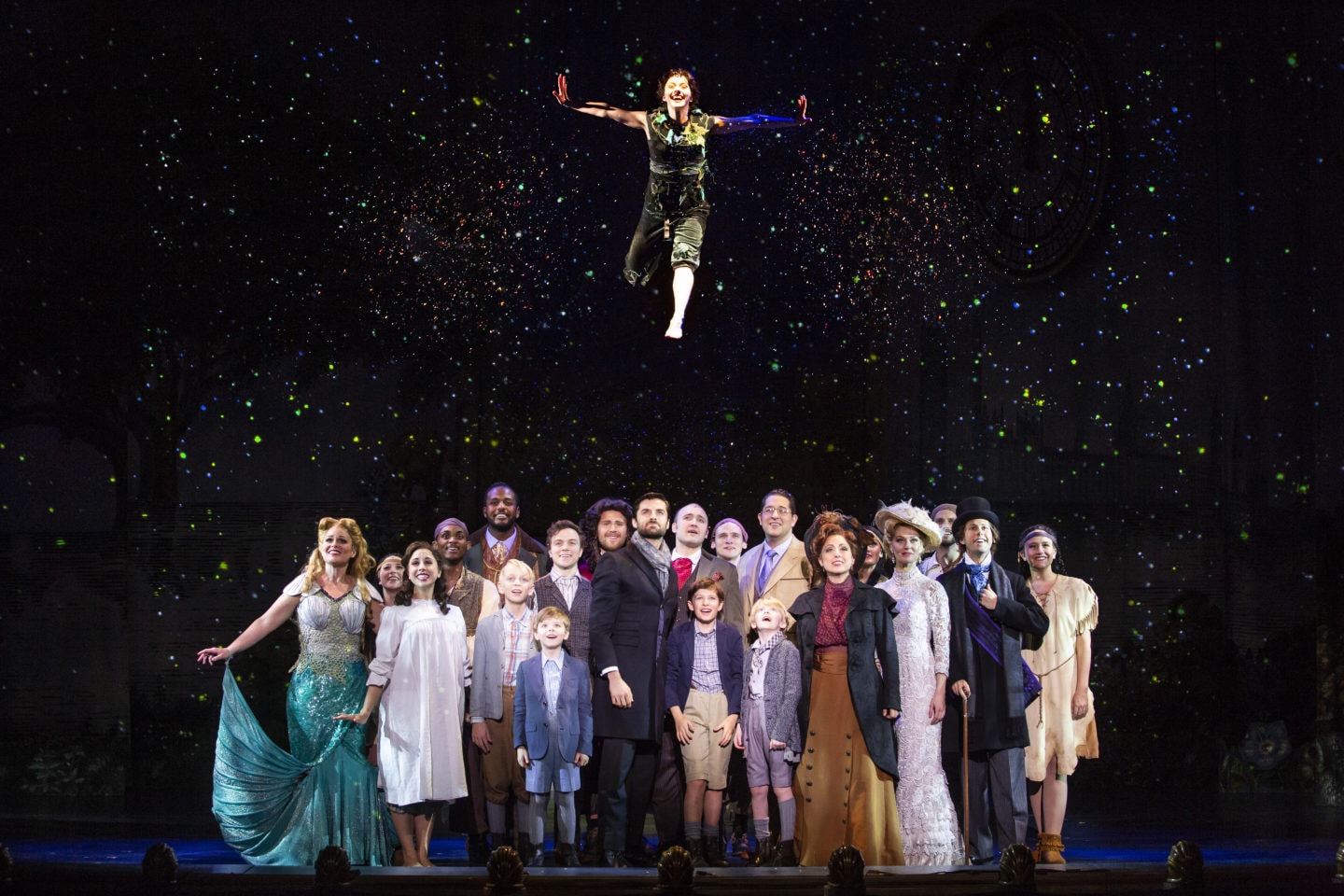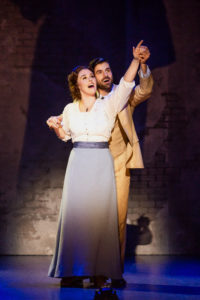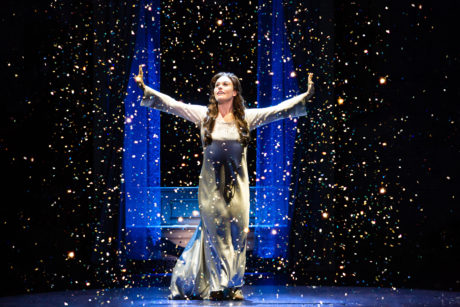The touring company of Finding Neverland (book by James Graham, music and lyrics by Gary Barlow and Elliot Kennedy) is making a mercifully brief stop at Washington’s National Theatre. Spinning a highly fictionalized, chronologically challenged, often counterfactual backstory of playwright J.M. Barrie’s creation of Peter Pan, the musical is exemplary of how neither a talented cast nor strong production values can save a fundamentally flawed vehicle.

Emotion is the engine of virtually any piece of musical theater, but not all emotion is created equal. There is strong, moving emotion that grows organically from characters’ development. Then there is manufactured sentimentality that is imposed by a show’s creators, carefully calibrated to manipulate an audience’s feelings. Finding Neverland trades in the latter.
It begins with cuteness. As is probably almost compulsory, the kids (Seth Erdly, Paul Schoeller, Josiah Smothers, and Brody Bett on Tuesday night) are cute. Aside from Peter (Erdly), who gets to play some additional dimensions and does so nicely, the children never get to be anything but adorable. The wonderfully well-trained dog is cute (drawing “awws” at every entrance). Barrie (Jeff Sullivan), the kids’ mother Sylvia (Ruby Gibbs), the kids, and the dog have a cute meet in the park early in the show.
It continues into the by-the-numbers musical theater romance between Barrie and Sylvia, proceeding from shy beginnings to a passionate kiss to canoodling in a pub. When the characters in a love duet are blocked in a pose that echoes the “Jack and Rose on the bow of the Titanic” moment, it’s painfully obvious that clichés are in flower. This approach to the material extends even to the major theatrical sin of sentimentalizing death, in a pallid parallel to the demise of opera characters like Violetta and Mimi.
Manufacturing audience reaction also mars the comedy in the show, which often depends on tired theater jokes. There’s the flaming gay actor Mr. Henshaw (Joshua William Green) who is the subject of “fairy” laugh lines. The confusion between Darling (Peter Pan’s father’s name) and darling (an endearment) rips off the famous “orphan/often” sequence in The Pirates of Penzance. The guests at a disastrous dinner party are nothing but stereotypically stuffy; the peak of the occasion’s humor is the snatching of a toupee from a pompous head.
Save in the second act’s “Play,” in which he somewhat uncharacteristically reminds his cast to be playful while performing a play, Barrie’s producer Charles Frohman (Connor McGriffin) is the picture of gruff and demanding. McGriffin also has perhaps the strongest scene of anyone in the cast when he doubles as what Forbidden Planet’s Dr. Morbius might call a “monster from the id,” the dark side of Barrie’s personality emerging to be personified as Captain Hook (“Hook”).

In the two lead roles, Sullivan and Gibbs both have exceedingly pleasing voices. Sullivan’s tenor can be both strong (as in “Stronger”) and lyrical (as in his duets with Gibbs, “Neverland” and “What You Mean to Me”). Gibbs has lyrical moments of her own, such as “All That Matters” and Sylvia’s Lullaby.” The level of singing in the production is uniformly high, though the numbers themselves, however well performed, are not memorable theater songs, frequently suffering from too-facile pop arrangements and unimaginative lyrics – musical empty calories.
The show is full of energetic – sometimes to the point of frenetic – dance numbers, expertly performed by the ensemble. Mia Michaels’ choreography has some decided quirks, including good deal of hopping up and down, exaggeratedly broad gestures, and thrown-back head positions.
There is plenty of industrialized light and magic in the production, with star effects, glittery fairy dust, and the frequent, highly successful use of projections. My favorite was a moving conglomeration of clocks – the passage of time is a major theme of the physical production – but changing cloudscapes were also very effective.
For all the technology used in the production, the scenic design (credited to Scott Pask) is strikingly traditional. This is a proscenium show, with scene changes primarily done with flown-in drops or flats. There is even a front-of-curtain scene, a device common in shows of the 1950s that has long since gone out of fashion.
All the people involved in the production – actors, dancers, technicians – do their job and do it well. The problem is that the job itself is misconceived. Originally produced by Harvey Weinstein and directed by Diane Paulus (Mia Walker recreated the direction for the tour), the show’s concept (Paulus articulates it in a trailer) seems to be that we all need to reach for our inner child to achieve fulfillment and that doing so is what allowed Barrie to create his classic play. In pushing this simplified, happy theme, Finding Neverland misses the ambiguity that is a major reason why Peter Pan still resonates well over a century after its publication.

The historical Barrie – a short Scot, not a tall handsome Englishman; a possibly asexual innocent (whose attentions to children, like those of Lewis Carroll, have looked suspicious to some biographers), not a romantic lover; a friend of the literary elite of early 20th-century London, including Shaw and Wells – was far more nuanced, and consequently far more interesting, than the character as written in the show. His path can be viewed as tragic. D.H. Lawrence once commented that “J.M. Barrie has a fatal touch for those he loves. They die.” In fact, the fates of most of the children portrayed in the show, as well as that of Frohman (who perished in the Lusitania), were extremely sad.
In fairness, it should be said that the audience at the National Theatre appeared to thoroughly enjoy the production. For myself, I’d rather smile at a crocodile.
Running Time: Two hours and 30 minutes, including one intermission.
Finding Neverland plays through March 3, 2019, at the National Theatre, 1321 Pennsylvania Avenue, NW, Washington DC. For tickets, call 800-514-3849 or go online.
Lighting Design, Kenneth Posner; Sound Design, Shannon Stanton; Projections, Jon Driscoll; Illusions, Paul Kieve; Air Sculptor, Daniel Wurtzel; Flying Effects, Hudson Scenic Studio





Wonderfully written! I haven’t seen it, and don’t intend to, since anything that smacks of being “adorable” is apt to send me straight to the bar. Or to a good movie. I really don’t understand why otherwise sane writers do such abominable things.
I have to say that I actually loved this show. I disagreed with the negative reviews when it was on Broadway. I found it to be fun and whimsical and a great show for parents and kids.